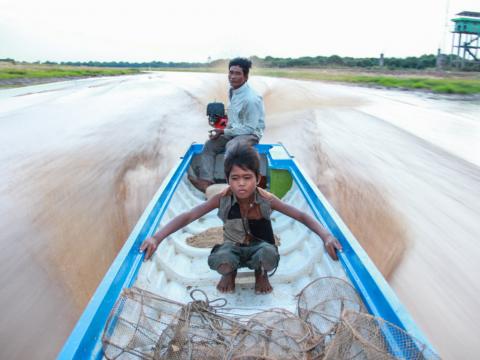From schoolboy to fisherboy

Under the stilt houses, hundreds of prawn and crayfish traps wait for the floods, a season when Kha Khav must travel far from home on a fishing boat, sometimes for months at a time.
Living in the elevated house with his parents and five siblings, the 12-year-old knows when the rainy season arrives, the home’s stilts will disappear under the surging water and going to school will be impossible.
“I earn 200,000 riels [about USD $50] a month,” he says of his job on the fishing boat. Like all the children living by Tonle Sap Lake, to the north-west of Cambodia’s capital, Phnom Penh, he had to learn to swim at a young age.
"I want to be a businessman, but I can’t dream like that."
Starting school very late, Khav stops his education when the lake swells sixfold with the monsoon rains, while children from 300 other families face the same staccato schooling.
With no watches or clocks, and definitely no satellite navigation, the fishermen on Khav’s boat rely on the sun, moon and stars to know the time and way home. Meanwhile, Khav belts out tunes such as ‘A Fisherman’s Life’ and ‘Rolling Fishing Boat’ to pass the time.
“I want to be a businessman,” he says loudly before pausing. Continuing more quietly, he adds, “But I can’t dream like that.”
Khav has no choice but to work day and night on the water, having done so since he was 10 years old. “My parents have a difficult life and find it hard to support us,” he says, “so I volunteered to help.”
As the oldest boy in the family, it is his responsibility to support the family. Traditionally, local parents teach their children to show their gratitude by earning money and taking care of them in old age.
Compounding the binding family spirit, poor educational, social and health services mean many children from poverty-stricken households can’t attend school, taking care of their younger siblings or working for the family instead.
A joint survey in 2012 by the Cambodian government and the UN’s International Labour Organization estimated nearly one-fifth of the nation’s children aged five to 17 were in work. Of these 750,000 children, over half were labourers and almost one-third had hazardous jobs.
To help those whose schooling is regularly interrupted, World Vision works with teachers, parents and the youngsters’ peers to promote formal and non-formal education in restored, child-friendly spaces.
Working to help eliminate child labour in Cambodia, World Vision provides families with school materials and enhances their income-earning potential, while also developing the authorities’ capacity and role of commune-level committees for children and women.
Partnering local non-governmental organisations and state bodies to create and implement laws and mechanisms to end child labour, the project has already benefited 28,000 children living in the capital and five other regions.
Khav is one.
World Vision has boosted his family’s catches, giving them healthier meals and income. And despite not daring to dream of his future, Khav has hopes for his younger siblings, saying, “I want to see them go on to higher education.”